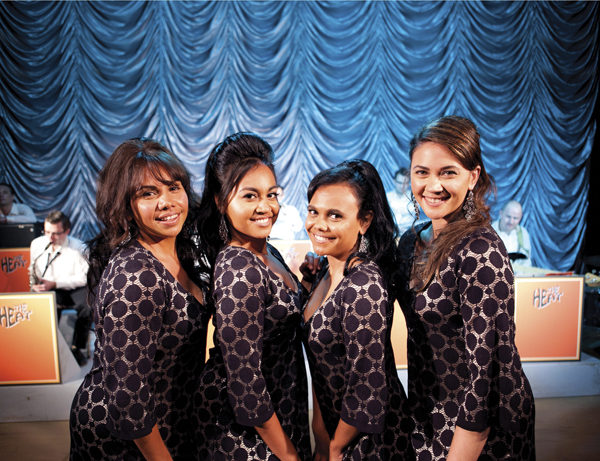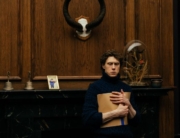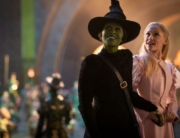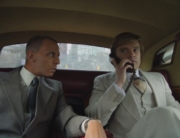
From left, Deborah Mailman, Jessica Mauboy, Miranda Tapsell, and Shari Sebbens in THE SAPPHIRES
(Lisa Tomasetti/The Weinstein Company)
The Sapphires is an irresistibly feel good, sound good movie that wears its heart and social relevance on its sparkly sleeve.
In 1958, three young sisters and their cousin sweetly harmonize as the Cummeragunja Songbirds in the desolate Australian outback. Their applauding aborigine family and friends at the mission reservation, with a range of skin colors, are not even citizens, but just considered as indigenous as the flora and fauna. Even when they are allowed to sing in their native language, it’s a Christian gospel song.
By 1968, aborigines have just been granted citizenship and are beginning to push for more rights and against racism. Now teenagers, the sisters are determined that it’s time to push their way into what’s been a whites-only talent contest in town. Gail (Deborah Mailman), the eldest, is the bossy one, and Cynthia (Miranda Tapsell), the adventurous one, but the youngest, Julie (Jessica Mauboy), has the big voice. (Mauboy is a former Australian Idol finalist.) She rebels against her mother’s restrictions, and she sneaks out to join her sisters. Even beautifully singing a Merle Haggard tune (akubra-hatted ranchers were fond of country and western cowboy songs), the racist audience rejects them.
But they attract a key fan—the down on his luck M.C. keyboardist Dave Lovelace (Chris O’Dowd). Far from his home in Ireland, he’s just as enthusiastic about the power of soul music as the Dublin impresario in Alan Parker’s The Commitments (1991). I half-expected him to proselytize with that famous line about the Irish being the blacks of Europe. Instead, he passionately links the power of R&B with the civil rights movement and the group’s aspirations, and he urges them to audition in Melbourne to perform for American troops in Vietnam.
Their mother agrees on condition that they stay with their ex-Songbird cousin, who they haven’t seen in years since the fair Kay (Shari Sebens) has been passing as white. But Kay is one of the “stolen generation,” who was removed by the government from her family to be raised with whites, as seen in a brief, serious flashback here that may be confusing for anyone who hasn’t seen the tragic policy carried out in Phillip Noyce’s Rabbit-Proof Fence (2002).
First the quartet has to learn dynamic song and dance routines with their lively back-up band, and then make sparkly costumes. They train much like their models, the Supremes, learning the classic period songs that are still beloved everywhere. (There’s even more revved up Stax selections than Motown.) From Saigon (actually filmed in Ho Chi Minh City) to M.A.S.H. units and the ever moving front line, they attract cheers from large audiences of troops (and romantic interests). For all the South Pacific-like fun and cri de racial tolerance amidst war, the tying up of (almost) all the loose ends romantically betrays the film’s origin as a stage musical.
Sterling aborigine talent who energized Rachel Perkins’ Bran Nue Dae (2009) shine here, too: the forceful Mailman and Mauboy’s singing as well as the choreography of Stephen Page, artistic director of the Bangarra Dance Theatre. Writer Tony Briggs also acted in that film, but this story is inspired by his mother’s and aunts’ experiences, albeit with considerable artistic license. In reality, while his mother and aunt toured, two of the other Sapphires refused the opportunity in protest against the war. The closing scroll salutes their subsequent contributions to aborigine culture and service, that all started out by their singing to family on the back of a truck in the outback.






Leave A Comment